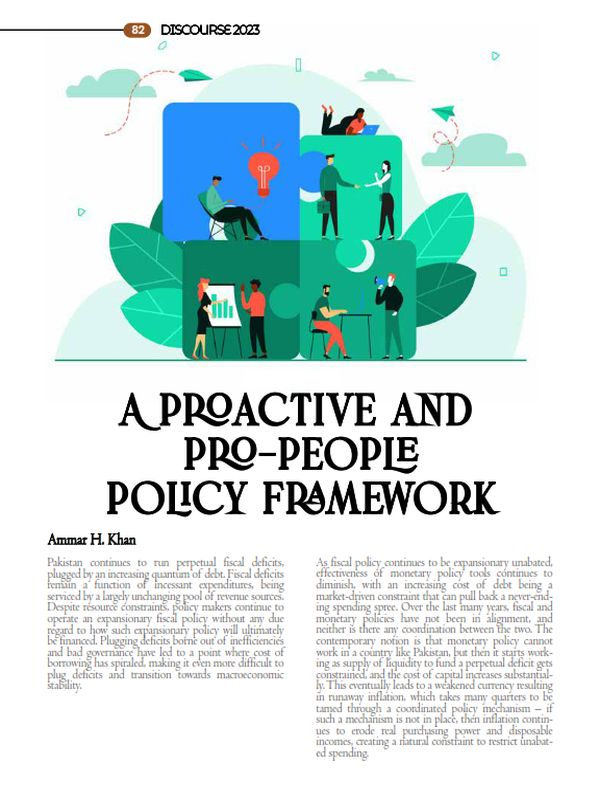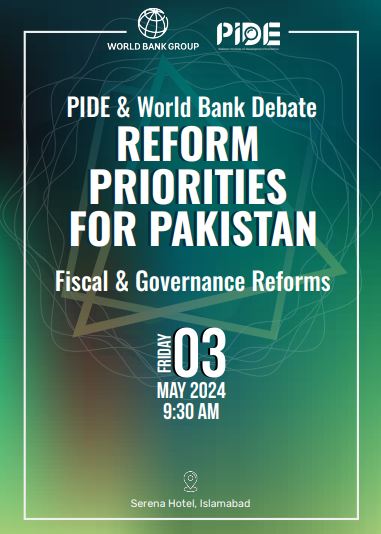A Proactive and Pro-People Policy Framework
Pakistan continues to run perpetual fiscal deficits, plugged by an increasing quantum of debt. Fiscal deficits remain a function of incessant expenditures, being serviced by a largely unchanging pool of revenue sources. Despite resource constraints, policy makers continue to operate an expansionary fiscal policy without any due regard to how such expansionary policy will ultimately be financed. Plugging deficits borne out of inefficiencies and bad governance have led to a point where cost of borrowing has spiraled, making it even more difficult to plug deficits and transition towards macroeconomic stability.
As fiscal policy continues to be expansionary unabated, effectiveness of monetary policy tools continues to diminish, with an increasing cost of debt being a market-driven constraint that can pull back a never-ending spending spree. Over the last many years, fiscal and monetary policies have not been in alignment, and neither is there any coordination between the two. The contemporary notion is that monetary policy cannot work in a country like Pakistan, but then it starts working as supply of liquidity to fund a perpetual deficit gets constrained, and the cost of capital increases substantially. This eventually leads to a weakened currency resulting in runaway inflation, which takes many quarters to be tamed through a coordinated policy mechanism – if such a mechanism is not in place, then inflation continues to erode real purchasing power and disposable incomes, creating a natural constraint to restrict unabated spending.
The policy disconnect cannot continue for long until it catches up in the form of excessive inflation. A central bank that has rarely been able to achieve its inflation target, either because it is too reactive, or because it is too constrained to be proactive does not help. We need to rethink policy making in a way that we stop fixating on the short term, and have a more medium to long term view of the economy. A myopic view leads to knee-jerk policy decisions which do solve the problem in the short term but create a much bigger problem in the mid-to-long term. An expansionary fiscal policy that led to the creation of power and gas circular debts is a manifestation of the same.
Extending the orientation of policy making towards a mid-to-long term horizon is critical to ensure any macroeconomic stability. The first order of business is to reduce inflation to bring it within its target range, and that cannot be done with a sovereign that continues to borrow to fund its expansionary fiscal policy. The fiscal policy needs to be constrained such that it reduces its reliance on printing money to solve its fiscal problems.
Such problems need to be solved through fiscal tools, which can be either through reduction of expenses, or through expansion of the revenue base through a widening of tax net, without creating further distortions in the economy. In-effect, fiscal problems need to be solved by fiscal tools, and not through monetary tools. It is primarily due to the excessive reliance on solving fiscal problems with monetary tools that we have ended up in a position where ability to increase revenue in real terms remains constrained, while real incomes across the board are wiped out due to unabated inflation, eventually resulting in restricted ability to achieve any sustainable growth.
There is a critical need to ensure that there is coordination between the fiscal and monetary policies, and one does not follow the other as a reactive measure. A prudent fiscal policy which focuses on reducing the fiscal deficit will eventually allow monetary policy to be more effective in terms of generating desired results. Inability to achieve targeted inflation will continue to erode real incomes while being a drag on sustainable growth. The policy paradigm needs to be reoriented such that it is pro-people, and serves the future generations of the country. If the policy framework continues to serve a few thousand households, and a few thousand beneficiaries who capitalise from policy capture, then things are only going to get worse.
If the government is actually serious about enabling better outcomes for the people of the country, and their future generations, it must put in place necessary measures to ensure macroeconomic stability, followed by measured growth which is driven by productivity improvements rather than an influx of borrowed capital, or investments that impose a very high rent. Only a pro-people policy framework can achieve such goals, without which we will be stuck in a low-growth trap while our per capita income continues to stay flat, or even declines as population growth rate outpaces economic growth. A coordinated policy structured for the long-term is always better than a reactive policy that is solving the current problem without thinking about the unintended consequences of such a policy decision.
The author is an independent macroeconomist. He can be found on Twitter as @rogueonomist.





